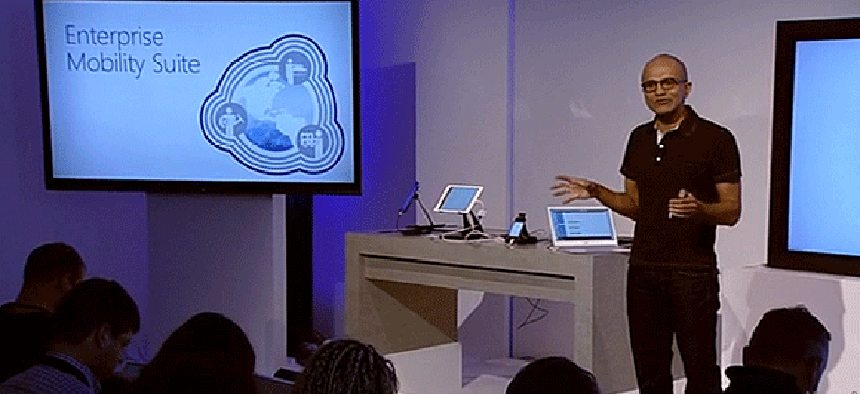More mobile from Microsoft: Office for iPad, Enterprise Mobility Suite licensing

Microsoft announced several new products, including a new Enterprise Mobility Suite licensing option and the long-awaited Office for iPad.
Last week Microsoft CEO Satya Nadella, speaking at a press conference in San Francisco, announced several new products illustrating his “mobile first, cloud first” theme.
Office for iPad is now available from the Apple Store. It's designed to run on iPads with iOS 7.0 or later iOS operating system versions. A "touch-first" version of Office for Windows will arrive later in Microsoft's Windows Store, as well as versions for "other popular programs," according to a Microsoft announcement. Office for iPad is free to use for reading or viewing documents. However, an Office 365 subscription is required to create or edit documents.
Microsoft is also making Office Mobile for iPhone, as well as Office Mobile for Android-based smartphones, free to use, according to Microsoft's announcement. Those mobile apps can be downloaded, either from the Apple Store or Google Play store, respectively. Microsoft had previously required Office 365 subscriptions to use those mobile apps. Office Mobile apps lack a lot of the functionality of the Office suite products, but users do have the ability to view and edit documents.
The company also announced plans to release a new Enterprise Mobility Suite (EMS) licensing option to enterprise volume licensing customer starting on May 1.
EMS licensing consists of the rights to use three products: Windows Azure Active Directory Premium, Windows Intune and Windows Azure Rights Management Services, which is a scheme for adding document security protections. The EMS subscription-based licensing will be issued on a "per-user basis," so it's not associated with specific device use. Supposedly, the new licensing will make it easier for organizations to implement bring-your-own-device types of scenarios while also enabling mobile device management capabilities by IT pros.
Windows Azure Active Directory Premium was released as a preview back in November, but it will hit "general availability" product release next month, according to a Microsoft blog post. The premium offering offers some added management controls for enterprises beyond those controls enabled through Microsoft's free Windows Azure Active Directory solution. Those additional controls include the provisioning of groups, management of SaaS-based applications and activity reporting for increased security. The Premium product also supports single sign-on to SaaS apps by end users, as well as multifactor authentication for added user verifications, plus the ability for end users to reset their passwords. Microsoft provides a service-level agreement of 99.9 percent uptime for the premium version and throws in use rights for Forefront Identity Manager.
Windows Intune is Microsoft's cloud-enabled device management product that supports various platforms, including Apple iOS, Google Android and Microsoft Windows, Windows RT and Windows Phone. It's periodically updated, including new features, with the last update occurring in January.
Microsoft plans to offer Windows Azure Active Directory Premium, Windows Azure Rights Management and Windows Intune as a bundled offering for $12 per user per month. However, the EMS licensing offering will provide that same bundle at a 30 percent discount for $7.50 per user per month when it's bought by organizations through Microsoft's enterprise volume licensing, according to Microsoft's data sheet.
News about Office for iPad and the new EMS licensing option got leaked earlier in an article by veteran Microsoft reporter Mary Jo Foley.
A longer version of this article originally appeared on Redmondmag.com, a sister site to GCN.





